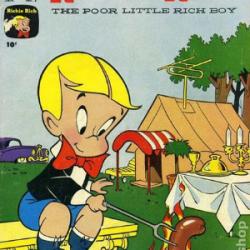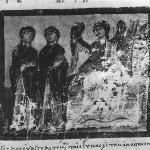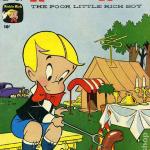In an op-ed at CNN’s Belief Blog titled “Name-calling is ‘rhetorical pornography,'” a trio of religious right figures urge Christians not to use ethnic and homophobic slurs.
I agree! The use of ethnic and homophobic slurs is hurtful and wrong. And, I suppose, I commend these three — Focus on the Family exec Jim Daly, Southern Baptist Seminary dean Russell Moore and Samuel Rodriguez of the National Hispanic Christian Leadership Conference — for supporting this unremarkable, unimpressive and bare-minimum moral and civic threshold.
Their op-ed reminds me somehow of that Chris Rock bit about people who “always want credit for some [stuff] they’re supposed to do”:
Derogatory terms for other human beings — regardless of how widely their views differ from ours or, more importantly, from the truths of Scripture — should never pass our lips. To call it rhetorical pornography, for the debasement it engenders, is not an overstatement.
To get into the terms specifically here would be to attach to them a dignity they don’t deserve. But we know them when we hear them: Epithets and cutting adjectives directed at gays and lesbians that go far beyond reasoned articulation of our biblical views about God’s design for human sexuality.
Cruel, dismissive descriptions of those who do not share our faith — whether they be of a different religion or none at all — serving to drive people further from the heart of Christ, the exact opposite of our calling as his modern-day disciples.
And, perhaps most distressingly, ethnic slurs against noncitizens in our country, people who, in many cases, are families just like our own, seeking the best quality of life they can achieve.
It’s hard to argue with the claim that such slurs are hurtful and shouldn’t be used. It’s hard to see why anyone would want to argue with that. And that means that it’s also hard to see why these guys felt the need to argue for that.
“What do you want,” Chris Rock asked, “a cookie?” And I suspect that, yes, actually, these men do want a cookie. I suspect part of the thinking here is an implicit bargain: If we agree to stop calling you people slurs, then you people have to agree to stop calling us bigots.
Another dynamic I suspect is at work here is the pragmatic realization that outright slurs harm their political cause. Whenever someone uses a homophobic slur, it’s a setback for the anti-gay agenda. Serious people are doing serious work trying to ensure that same-sex couples are never permitted to marry or to adopt children, and to ensure that employers are free to fire qualified GLBT workers with impunity. It doesn’t aid their efforts when somebody shoots off his mouth and uses derogatory terms that create sympathy for those sinful, second-class citizens who “deny the truths of Scripture.”
And I suspect, also, that this is partly just the old standard ploy of redefining bigotry as a term that applies only to the most extreme forms. You’re familiar with how that shtick works — 1) Someone standing on a corner hollering the N-word is acting racist, so, therefore, 2) If I’m not standing on a corner hollering the N-word, I cannot be accused of racism.
Those three things are related — they’re all expressions a desire to avoid being labeled a bigot while defending legal discrimination. It may seem cynical for me to suspect that’s what’s behind this op-ed, but what would be the non-cynical explanation for it? I’m casting a cynical eye toward these three individuals. The alternative would be to accept that they themselves have purely innocent motives — and that therefore the entire evangelical community must be so rife with the use of vile ethnic and homophobic slurs that such an op-ed was necessary.
“Saints should always be judged guilty until they are proved innocent,” George Orwell said. The same holds true for calls for “civility.” If someone is pleading for greater civility with one hand, the odds are their other hand is either picking your pocket or pointing a knife at your back. Appeals for civility tend to be loudest from those who hope to ensure that no one else can hold them accountable for lying, bigotry, corruption or exploitation.
That’s not to say that civility itself is not a Good Thing. It is, like patriotism, a worthy second-tier virtue. But it is also, like patriotism, a refuge for scoundrels.
Consider, for example, that Russell Moore is a leader in the “complementation” advocacy group, the Council on Biblical Manhood & Womanhood. The group describes itself this way:
In opposition to the growing movement of feminist egalitarianism they articulated what is now known as the complementarian position which affirms that men and women are equal in the image of God, but maintain complementary differences in role and function. In the home, men lovingly are to lead their wives and family as women intelligently are to submit to the leadership of their husbands. In the church, while men and women share equally in the blessings of salvation, some governing and teaching roles are restricted to men.
That’s a very polite statement, very refined, very civil. It avoids even a hint of “derogatory terms for other human beings” or of “rhetorical pornography.”
That’s how the CBMW works. In eminently polite, refined and civil terms, the group argues that all women have a “role and function” that is intrinsically subordinate to men.
And if anyone responds that such a view is simple bigotry and misogynist hogwash, they will cluck their tongues and shake their heads sadly at such an unbecoming violation of the rules of “civility.”
What they don’t understand, and what all three authors of that CNN op-ed don’t seem to understand, is that no slur, epithet or derogatory term could ever be as uncivil as the defense of legal discrimination.
(See also, from Tony Jones: “Misogynists Urged to Up Their Game.”)
















